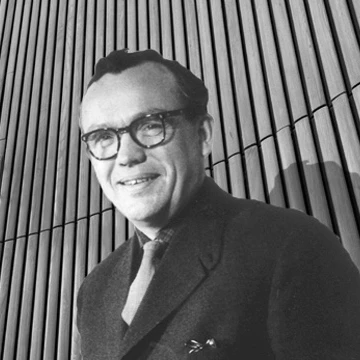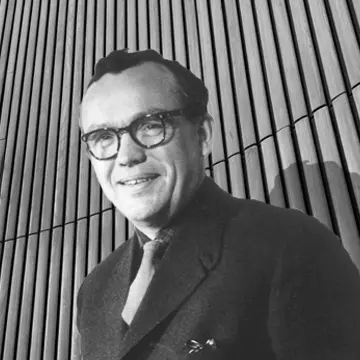
Finn Juhl
Denmark
Produkte von Finn Juhl
Alle anzeigenÜber Finn Juhl



Finn Juhl
Der dänische Architekt, Interior- und Industriedesigner Finn Juhl ist heute hauptsächlich für sein Möbeldesign bekannt. Er gehört zu den prominenten Vertretern des dänischen Designs der 1940er Jahre.
Finn Juhl Biografie
Finn Juhl wurde am 30. Januar 1912 in Frederiksberg geboren. Auf Druck des Vaters studierte er zwischen 1930 und 1934 Architektur an der Königlich Dänischen Kunstakademie in Kopenhagen. Im Anschluss war er beim renommierten Architekten Vilhelm Lauritzen tätig, der wesentlich zum dänischen Modernismus beigetragen hatte. Während dieser Zeit erhielt er die C.F. Hansen Medaille. Ein Jahr später lehrte Finn Juhl Innenarchitektur an der Kopenhagener Schule und gründete im Anschluss sein erstes eigenes Designstudio. Während der 1940er Jahre unterrichtete er auch an der Frederiksberg Technical School und beeinflusste so die nächste Generation Designer massgeblich mit. 1942 entwarf Juhl ein Haus für sich persönlich, welches heute als Finn Juhl's House bekannt ist. Sein U.S. Debut gab Juhl im Jahr 1951 bei der Good Design Ausstellung in Chicago und im Museum of Modern Art in New York.
In den Jahren 1954 und 1957 wurde er mehrfach auf der Mailänder Triennale auszeichnet. Er war für die Gestaltung mehrerer Objekte für die dänische Botschaft in Washinton, D.C. und für Büros und Inneneinrichtungen von Flugzeugen der Scandinavian Airlines verantwortlich. Während der 1950er Jahre wurde Juhl zum Innenarchitekt der Trusteeship Council Chamber beim New York Headquarters der United States berufen. Dort entwarf er die Stühle für die Abgeordneten. Zusätzlich dazu war Juhl auch in der Keramikbranche tätig: Für die Denmark's Bing & Grondahl Factory kreierte er ein Porzellan Dinner Set. Andere Aufträge waren Kühlschränke für General Electric und Glaswaren für Georg Jensen.
Poet Sofa: Teil des Juhl’s House
Das Poet Sofa wurde im Jahr 1941 von Finn Juhl für sein eigenes Haus entworfen. Juhl konzipierte das Poet Sofa mit geschwungenen organischen Formen. Das Objekt besticht vor allem durch seine handgenähte Polsterung. Das übrige Europa und die USA entdeckten das Poet Sofa erst im Zuge der Teak-Modern-Diskussion, zehn Jahre später.
Finn Juhl 45 Chair
Seinen 45 Chair konzipierte Juhl 1945 und brach damit mit den bestehenden Traditionen des Sesseldesigns. Das Hauptmerkmal dieses Sessels ist die Befreiung des Sitzes und der Rückenlehne vom Rahmen. Das Ergebnis ist ein einfacher, eleganter und bemerkenswerter Sessel, der Finn Juhls Design massgebend charakterisierte und ihn zu einem weltbekannten Designer machte.
© by Architonic



